Understanding the Canadian Dental Care Plan: What It Means for You
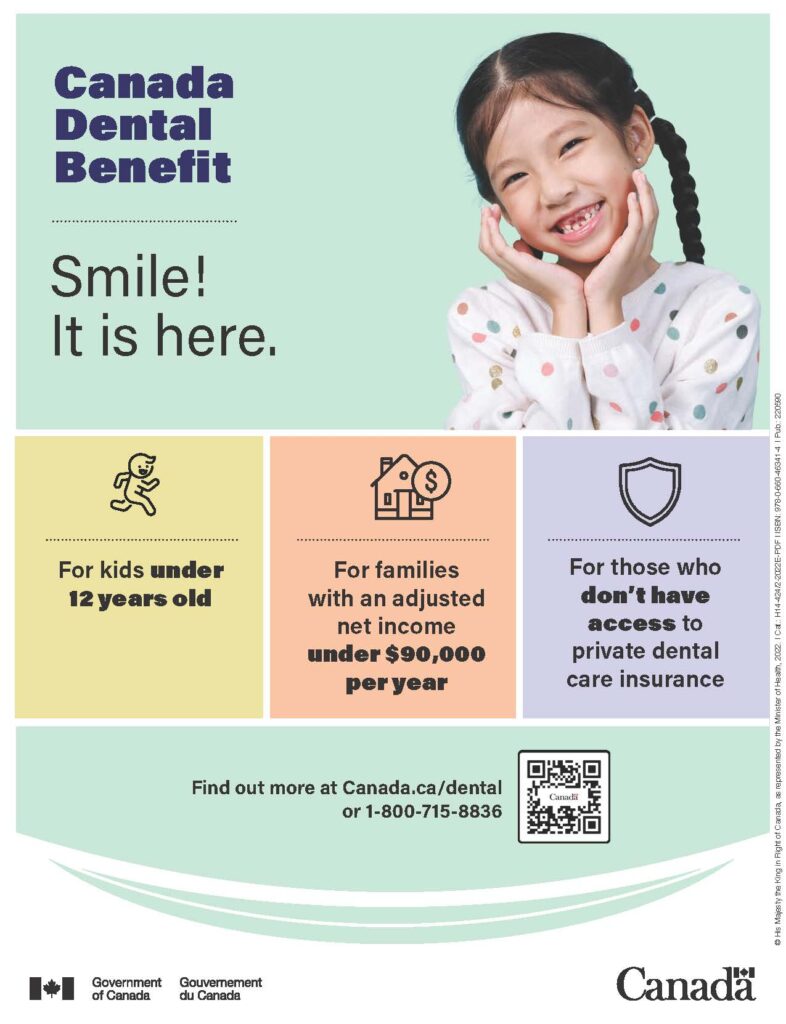
Published by Dorset Dental, Scarborough – 119 Dorset Road, ON M1M 2S9 The Canadian government has recently launched the Canadian Dental Care Plan (CDCP)—a groundbreaking initiative aimed at making dental care more accessible and affordable for millions of Canadians. At Dorset Dental, your trusted neighborhood dentist in Scarborough, we’re committed to keeping our community informed and prepared. Here’s what you need to know about the CDCP and how it may benefit you and your family. What is the Canadian Dental Care Plan? The CDCP is a national program designed to provide coverage for essential oral health care to eligible Canadian residents who do not have access to private dental insurance and fall within specific income brackets. The plan is being rolled out in phases, starting with seniors and gradually expanding to include other age groups and vulnerable populations. Who is Eligible? As of 2025, eligibility includes: Seniors aged 65 and over Children under 18 Adults with disabilities Canadian residents with a household income of less than $90,000 annually Must not have private dental insurance Eligibility will expand in stages, so it’s important to stay updated with official government announcements. What Does the Plan Cover? The CDCP covers a wide range of dentistry services, such as: Exams and cleanings X-rays Fillings Root canals Dentures Extractions Periodontal (gum) care Coverage levels depend on your household income. Those with lower incomes may have full coverage, while others may pay a small co-payment. How to Apply The application process is handled by Service Canada. Seniors should have already started receiving invitations to apply. If you’re unsure about your eligibility or how to apply, the team at Dorset Dental is happy to guide you through the process. How Dorset Dental Can Help At Dorset Dental, we proudly support initiatives that improve access to oral health care. As a well-established Scarborough dentist, we are preparing to work closely with the CDCP to ensure our patients get the care they need. Whether you’re looking for a dentist near me, or simply want to understand how this plan can benefit your family, we’re here to help. Our experienced team is dedicated to providing compassionate, high-quality dentistry for patients of all ages. From preventive care to restorative treatments, your neighborhood dentist is just around the corner. If you’re eligible for the plan or want to find out how this new program affects your dental care, give us a call at 416-261-2946 or visit us at 119 Dorset Road. We’ll help you navigate your options and continue to deliver the exceptional care you deserve. Don’t Let Cost Hold Back Your Smile.Let Dorset Dental be your go-to dentist in Scarborough—now and always. Stay tuned for updates as the Canadian Dental Care Plan continues to evolve. Be sure to follow us on social media or subscribe to our newsletter for the latest news.
Hop Into Easter With a Healthy Smile!

Spring is in the air, and Easter is just around the corner! As we celebrate with family, friends, and of course, delicious treats, Dorset Dental is here to help you maintain a bright and healthy smile. While chocolate bunnies and candy-filled eggs are tempting, it’s important to keep your oral health in mind so you can enjoy the holiday without any tooth troubles. Easter Treats: The Good, The Bad, and The Cavity-Causing Easter often comes with an abundance of sugary sweets. While an occasional treat is fine, some candies are more harmful to your teeth than others. Sticky and Gummy Candies – These cling to your teeth, increasing the risk of cavities. Hard Candies – Sucking on hard candies exposes your teeth to sugar for a long period, which can lead to decay. Chocolate – A better choice! It melts away quickly, reducing sugar exposure on your teeth. While it’s okay to enjoy your favorite treats, it’s best to eat them in moderation and during mealtimes rather than as frequent snacks. This helps minimize the amount of time sugar stays on your teeth and reduces the risk of cavities. Easter Basket Alternatives for a Tooth-Friendly Celebration Instead of filling Easter baskets with only sweets, consider adding: Sugar-free gum to stimulate saliva and wash away food particles. Fun toothbrushes and toothpaste with kids’ favorite characters. Non-food treats like stickers, toys, or coloring books. Dark chocolate, which contains less sugar than milk chocolate and offers some antioxidant benefits. Encouraging children to enjoy non-candy surprises can help build good habits that last a lifetime while still keeping Easter fun and exciting! Post-Easter Dental Tips Enjoying your Easter treats in moderation is key, but here are some extra tips to protect your smile: Rinse with water after eating sweets to wash away excess sugar. Brush and floss regularly, especially after indulging in sticky treats. Eat crunchy fruits and vegetables like apples and carrots to help clean teeth naturally. Schedule your post-holiday dental check-up at Dorset Dental to keep your smile in top shape! Why Choose Dorset Dental? At Dorset Dental, we are dedicated to providing high-quality dental care in a warm and welcoming environment. Our skilled dentists in Scarborough use the latest technology and techniques to keep your teeth healthy and strong. Whether you’re due for a cleaning, need a cavity filled, or are interested in cosmetic dentistry, our team is here to help. Visit Your Trusted Dentist in Scarborough As we embrace the new season, it’s the perfect time for a dental cleaning and check-up! At Dorset Dental, our experienced dentists are committed to providing top-notch dental care for the Scarborough community. Whether you need a routine cleaning, a cavity check, or more advanced dental treatments, our team is here to help. Call Dorset Dental at 416-261-2946 or visit us at 119 Dorset Road, Scarborough, ON to book your appointment today. Wishing you a joyful and tooth-friendly Easter from all of us at Dorset Dental!
Spring Cleaning for a Fresh Smile: Why Your Teeth Deserve a Seasonal Refresh

Spring is finally here! As you declutter your home, organize your space, and embrace a fresh start, don’t forget about your smile. Just like your home, your teeth and gums can benefit from a good spring cleaning. At Dorset Dental, your trusted Scarborough dentist, we’re here to help you refresh your oral health and get your smile in top shape for the new season! Out With the Old, In With the New Spring cleaning is all about removing what’s no longer serving you and making room for what’s fresh and beneficial. The same applies to your oral health. Plaque and tartar build up over time, and if left unchecked, they can lead to cavities, gum disease, and bad breath. A professional dental cleaning at Dorset Dental removes this buildup, giving your teeth a clean slate. A Deep Clean for a Brighter Smile Just as you dust, mop, and scrub every corner of your home, your teeth deserve the same attention. Even with diligent brushing and flossing, it’s nearly impossible to remove all the plaque and bacteria that accumulate in hard-to-reach areas. Our hygienists at Dorset Dental in Scarborough use professional tools and techniques to ensure your teeth get the deep clean they need. Check for Hidden Issues Spring cleaning is also the perfect time to inspect for any hidden issues in your home—and in your mouth! Regular dental checkups allow us to detect early signs of cavities, gum disease, or other oral health concerns before they become bigger problems. If you’re experiencing pain or discomfort, our emergency dentist in Scarborough is here to help when you need urgent care. Refresh Your Oral Care Routine Spring is a great time to evaluate your oral care habits and make positive changes. Have you been using the same toothbrush for months? It’s time to replace it! Are you skipping flossing? Try incorporating it into your daily routine. Small changes can make a big difference in maintaining a healthy smile year-round. Schedule Your Spring Dental Cleaning at Dorset Dental As you tackle your spring cleaning checklist, don’t forget to add a dental visit to your to-do list. A fresh, healthy smile is just as important as a tidy home! Book your appointment today by calling Dorset Dental at 416-261-2946 or visiting us at 119 Dorset Road, Scarborough. Whether you need a routine cleaning or an emergency dentist, Dorset Dental is here for all your dental needs in Scarborough. Let’s welcome spring with bright, healthy smiles! Photo by The Humble Co. on Unsplash
Spring Smiles: Getting Your Child’s Oral Health Ready for the Season

As the snow melts and flowers begin to bloom, spring is the perfect time to refresh your child’s oral health routine. With March Break just around the corner, it’s an excellent opportunity to schedule a dental check-up and reinforce good habits that will keep their smiles bright all season long. At Dorset Dental, your trusted Scarborough dentist located near the beautiful Scarborough Bluffs, we’re here to help families in Scarborough ensure their children have healthy teeth and gums for the months ahead. Why Spring is the Perfect Time for a Dental Check-Up Winter months can take a toll on oral health. Holiday treats and colder weather often mean more sugary foods and less motivation to brush and floss regularly. Spring is a great time to assess any potential issues and get your child’s dental health back on track. A visit to the dentist in Scarborough before the hustle and bustle of summer activities can help prevent cavities, ensure proper oral hygiene, and set the foundation for a healthy year ahead. Tips for a Healthy Spring Smile Schedule a Dental Visit March Break is an ideal time to book a visit to Dorset Dental in Scarborough. Regular check-ups help detect early signs of tooth decay and ensure your child’s teeth are growing properly. If it’s been six months or longer since their last visit, now is the time to see a trusted Scarborough dentist! Refresh Oral Hygiene Habits With the change in season, take a moment to check in on your child’s brushing and flossing routine. Encourage them to brush for two minutes twice a day with fluoride toothpaste and to floss daily to remove plaque build-up. Switch Out Old Toothbrushes Toothbrushes should be replaced every three to four months or sooner if the bristles are frayed. A new toothbrush can make a big difference in keeping teeth clean and healthy. Pack a Healthy Lunch for Outings With warmer weather comes more family outings. Be mindful of your child’s diet by including tooth-friendly snacks such as cheese, nuts, yogurt, and crunchy fruits and vegetables. Avoid sugary drinks and opt for water instead. Protect Their Teeth During Outdoor Activities Spring sports and outdoor play are great for kids, but they also come with the risk of dental injuries. If your child participates in activities like soccer, biking, or skateboarding, consider getting a custom mouthguard to protect their teeth. Visit Dorset Dental This March Break Spring is all about fresh starts, and what better way to start the season than with a healthy smile? At Dorset Dental, we welcome families in Scarborough and the surrounding areas to visit us for a comprehensive dental check-up. Whether it’s your child’s first visit or a routine appointment, our friendly team is here to make their experience comfortable and stress-free. Book an appointment with Dorset Dental in Scarborough today and let’s keep those smiles shining all spring long! Call us or visit our website to schedule your visit before March Break ends.
The Importance of Local Dental Care in Scarborough
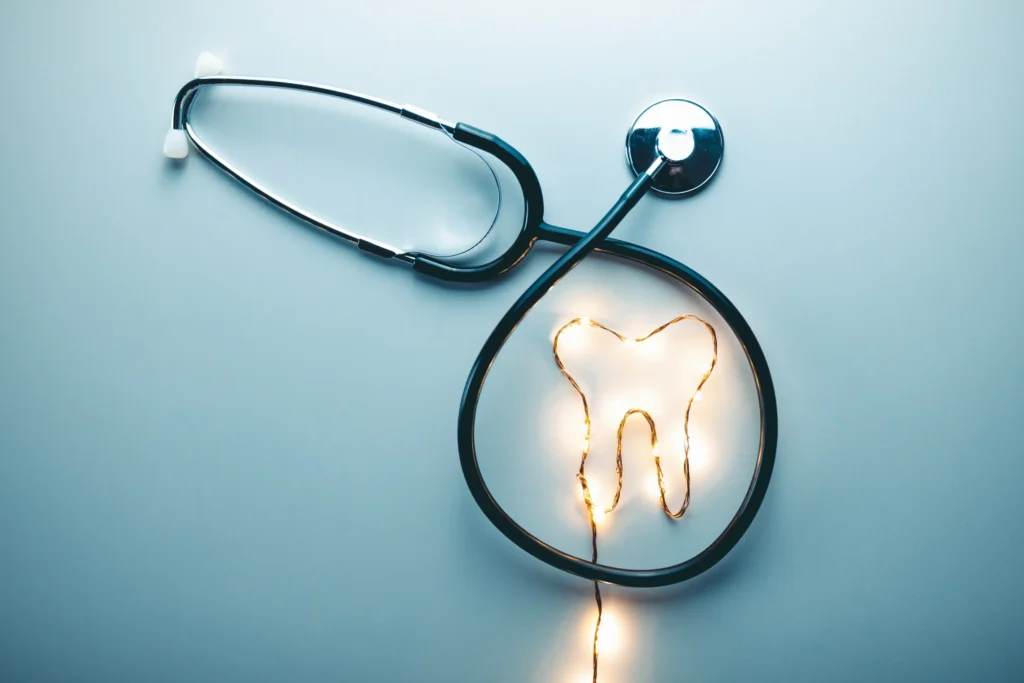
Your Guide to Maintaining Healthy Teeth with Dorset Dental Living in Scarborough, it’s essential to have access to reliable dental care. Your teeth play a vital role in your overall health and wellbeing, making it crucial to find a local dentist who can provide comprehensive dental services. In this blog, we’ll explore the importance of dental care, the benefits of choosing Dorset Dental in Scarborough, and tips for maintaining healthy teeth. Why Dental Care Matters Dental care is more than just maintaining a bright smile. It is integral to your overall health. Poor oral hygiene can lead to a variety of health issues, including gum disease, tooth decay, and even heart disease. Regular visits to your dentist help prevent these problems and ensure that your teeth and gums remain healthy. Preventive Care Preventive dental care includes regular cleanings, exams, and x-rays. These routine visits help your dentist identify and treat issues before they become serious. Dorset Dental in Scarborough can offer personalized care tailored to your unique needs, ensuring that your teeth stay healthy and strong. Treatment of Dental Issues If you experience any dental problems, such as cavities, gum disease, or tooth sensitivity, Dorset Dental can provide the necessary treatments to restore your oral health. With advanced dental technology and techniques, Dorset Dental in Scarborough can efficiently address dental issues and help you maintain a healthy smile. Benefits of Choosing a Local Dentist in Scarborough When it comes to dental care, choosing a local dentist has numerous advantages. Here are some reasons why Dorset Dental, a local Scarborough dentist, is the best choice for you and your family: Convenience One of the most significant benefits of choosing a local dentist is convenience. With Dorset Dental located close to home, you can easily schedule appointments and reduce travel time. This convenience makes it easier to keep up with regular dental visits, ensuring you receive the ongoing care you need. Personalized Care Local dentists are more likely to develop a personal relationship with their patients. By choosing Dorset Dental in Scarborough, you can benefit from personalized care tailored to your specific dental needs. Dorset Dental will understand your dental history and preferences, providing a higher level of care. Community Support Supporting a local dentist means contributing to the local economy and fostering a sense of community. Local dentists, like Dorset Dental, are invested in the wellbeing of their community and are more likely to participate in local events and initiatives. By choosing Dorset Dental, you’re helping to build a stronger, healthier Scarborough. Accessibility Accessibility is another crucial factor when choosing a local dentist. Dorset Dental in Scarborough will have office hours that accommodate your schedule, making it easier to book appointments at convenient times. Additionally, Dorset Dental is more likely to offer emergency dental services, ensuring you have access to care when you need it most. Tips for Maintaining Healthy Teeth Maintaining healthy teeth requires a combination of professional dental care and good oral hygiene practices at home. Here are some tips to help you keep your teeth in top shape: Brush and Floss Regularly Brushing and flossing are the foundation of good oral hygiene. Brush your teeth at least twice a day using a fluoride toothpaste and a soft-bristled toothbrush. Floss daily to remove plaque and food particles from between your teeth and under your gumline. Eat a Balanced Diet A healthy diet plays a significant role in maintaining healthy teeth. Limit your consumption of sugary and acidic foods, which can contribute to tooth decay. Instead, focus on eating a balanced diet rich in fruits, vegetables, lean proteins, and whole grains. Foods high in calcium and vitamin D, such as dairy products, can help strengthen your teeth. Avoid Tobacco Products Tobacco use is detrimental to your oral health. It can cause gum disease, tooth discoloration, and even oral cancer. If you smoke or use other tobacco products, consider quitting to protect your teeth and overall health. Visit Your Dentist Regularly Regular dental check-ups and cleanings are essential for maintaining healthy teeth. Schedule visits to Dorset Dental in Scarborough every six months, or as recommended by your dentist. These routine visits allow your dentist to monitor your oral health and address any issues early on. Finding the Right Dentist in Scarborough Choosing the right dentist is crucial for maintaining your oral health. Here are some tips to help you find the best local dentist in Scarborough: Ask for Recommendations Start by asking friends, family, and coworkers for recommendations. Personal experiences and referrals can provide valuable insights into the quality of care provided by local dentists. Read Online Reviews Online reviews can help you gauge the reputation of dentists in Scarborough. Look for dentists with positive reviews and high ratings. Pay attention to comments about the dentist’s professionalism, the quality of care, and the overall patient experience. Consider Their Services Different dentists offer various services, so it’s essential to find a dentist who can meet your specific needs. Look for a dentist who provides comprehensive dental care, including preventive, restorative, and cosmetic services. Check Their Credentials Ensure that your chosen dentist is licensed and has the necessary qualifications. You can verify a dentist’s credentials through the Royal College of Dental Surgeons of Ontario (RCDSO) website. Schedule a Consultation Before committing to a dentist, schedule a consultation to meet them in person. This visit will give you an opportunity to ask questions, discuss your dental needs, and evaluate the dentist’s office environment. Conclusion Dental care is essential for maintaining healthy teeth and overall wellbeing. By choosing Dorset Dental in Scarborough, you can enjoy the convenience, personalized care, and community support that come with staying close to home. Remember to brush and floss regularly, eat a balanced diet, avoid tobacco products, and visit your dentist regularly to keep your teeth in top condition. With Dorset Dental, you can achieve and maintain a healthy, beautiful smile for years to come.
Find Out If Teeth Whitening Is Right For You
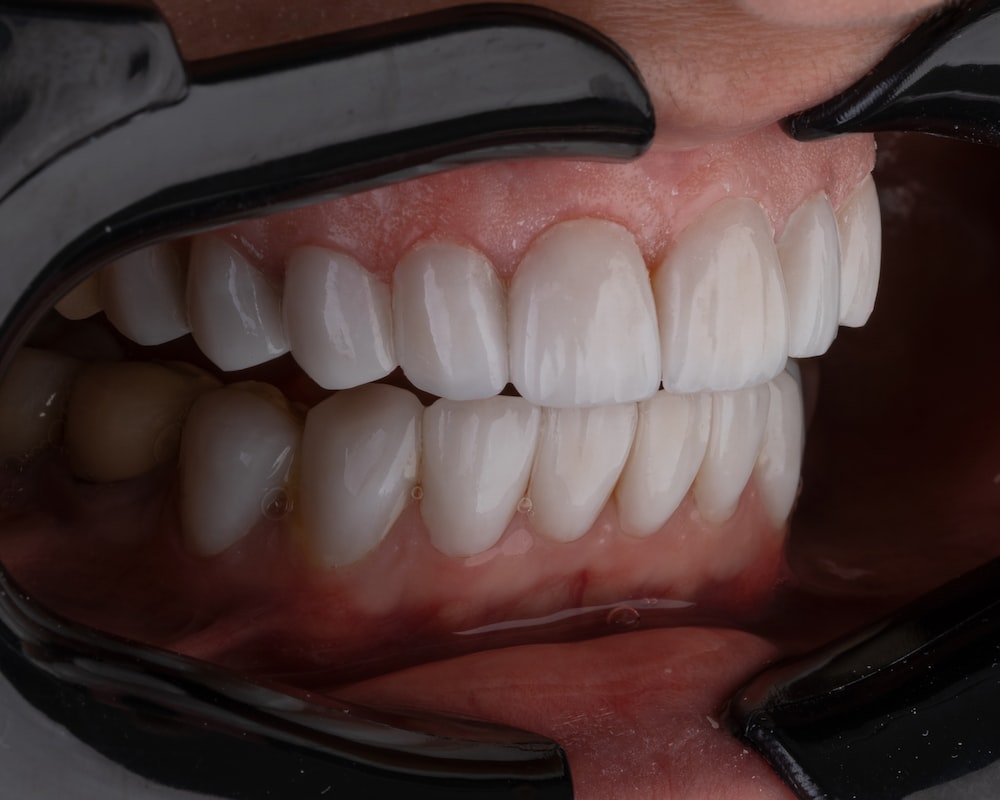
Are you self-conscious about the color of your teeth? Do you wish you had a brighter, whiter smile? If so, you’re not alone. Many people struggle with discolored or stained teeth, which can impact their confidence and overall appearance. Fortunately, there are solutions available, and one of the most popular options is teeth whitening. But before you dive into a whitening treatment, it’s important to understand if it’s the right choice for you. In this blog post, we’ll explore the causes of stained teeth, the differences between teeth cleaning and whitening, who is eligible for whitening, and what results you can expect. By the end, you’ll have a better understanding of whether tooth whitening is the solution you’ve been searching for. Causes of Stained Teeth There are several reasons why your teeth may become discolored or stained over time. Understanding the underlying causes can help you determine the best course of action to achieve the bright, white smile you desire. One of the most common causes of tooth discoloration is the natural aging process. As we get older, the enamel on our teeth can start to wear down, revealing the yellowish dentin layer underneath. This can give our teeth a duller, more yellow appearance. Another major culprit of tooth staining is the foods and beverages we consume. Things like coffee, tea, red wine, and dark-colored sauces and dressings can all leave behind stubborn stains on our teeth. Tobacco use, both smoking and chewing, is also a significant contributor to tooth discoloration. Certain medications can also cause teeth to become discolored. Antibiotics like tetracycline, for example, can lead to a grayish or brownish hue in developing teeth. Some high blood pressure medications and antidepressants have also been linked to tooth staining. Trauma or injury to a tooth can also result in discoloration. If a tooth has experienced any kind of physical damage, the inner structures of the tooth may become compromised, leading to a darkened appearance. Finally, poor oral hygiene habits can allow plaque and tartar buildup, which can contribute to a yellowed or stained look. Regular brushing, flossing, and professional cleanings are essential for maintaining a bright, healthy smile. Understanding the specific causes of your tooth discoloration can help you determine the best treatment option. If the staining is primarily due to lifestyle factors like diet or smoking, teeth whitening may be a suitable solution. However, if the discoloration is the result of an underlying medical condition or physical trauma, other treatments may be necessary. Teeth Cleaning vs. Whitening When it comes to addressing discolored or stained teeth, many people are unsure of the difference between teeth cleaning and teeth whitening. Both procedures can help improve the appearance of your smile, but they work in different ways. Teeth cleaning, also known as a professional dental cleaning, is a routine procedure performed by a dental hygienist. During a cleaning, the hygienist uses specialized tools to remove built-up plaque and tartar from the surfaces of your teeth. This helps to eliminate surface stains and discoloration, leaving your teeth feeling clean and refreshed. Teeth whitening, on the other hand, is a cosmetic procedure designed to lighten the actual color of your teeth. There are a few different whitening methods available, including: In-office whitening: This is a professional treatment performed by a dentist. It uses a highly concentrated whitening gel and specialized light or laser to quickly and effectively whiten your teeth. Take-home whitening kits: These kits contain a lower concentration of whitening gel that you apply to your teeth using custom-fitted trays. You can use them at home over the course of several weeks to gradually achieve your desired results. Over-the-counter whitening products: These include whitening toothpastes, strips, gels, and rinses that you can purchase and use at home. While they may be more affordable, they tend to be less effective than professional treatments. The key difference between cleaning and whitening is that cleaning removes surface stains, while whitening actually changes the underlying color of your teeth. Cleaning can help maintain the results of whitening treatments, but it won’t address deeper discoloration on its own. In many cases, a combination of professional cleaning and whitening can provide the best results. The cleaning helps prepare your teeth for the whitening process, while the whitening then lifts and brightens the overall color. Working with your dentist to develop a comprehensive treatment plan can ensure you achieve the sparkling, confident smile you’ve been dreaming of. Eligibility for Teeth Whitening Not everyone is an ideal candidate for teeth whitening. There are a few factors that can determine your eligibility and the type of whitening treatment that may work best for you. One of the most important considerations is the underlying cause of your tooth discoloration. As we discussed earlier, stains and discoloration can be the result of a variety of factors, from lifestyle habits to medical conditions. If the discoloration is primarily due to surface stains, then whitening may be an effective solution. However, if the discoloration is the result of an underlying issue like enamel erosion or tooth trauma, whitening may not be as effective. Your current oral health status is also a key factor. If you have any existing dental work, such as fillings, crowns, or veneers, whitening may not be able to effectively lighten those areas. Whitening also works best on natural, healthy teeth. If you have any cavities, gum disease, or other oral health problems, those will need to be addressed before whitening can be safely performed. Your age can also play a role in your whitening eligibility. Younger patients, whose teeth are generally healthier and less discolored, tend to see the best results from whitening treatments. Older patients, whose enamel has worn down over time, may experience more limited results. Finally, your sensitivity level is an important consideration. Whitening treatments can sometimes cause temporary tooth sensitivity or gum irritation, especially for those with already sensitive teeth. Your dentist can help determine if you’re a good candidate for whitening and
6 Dental Emergencies That Need Immediate Attention
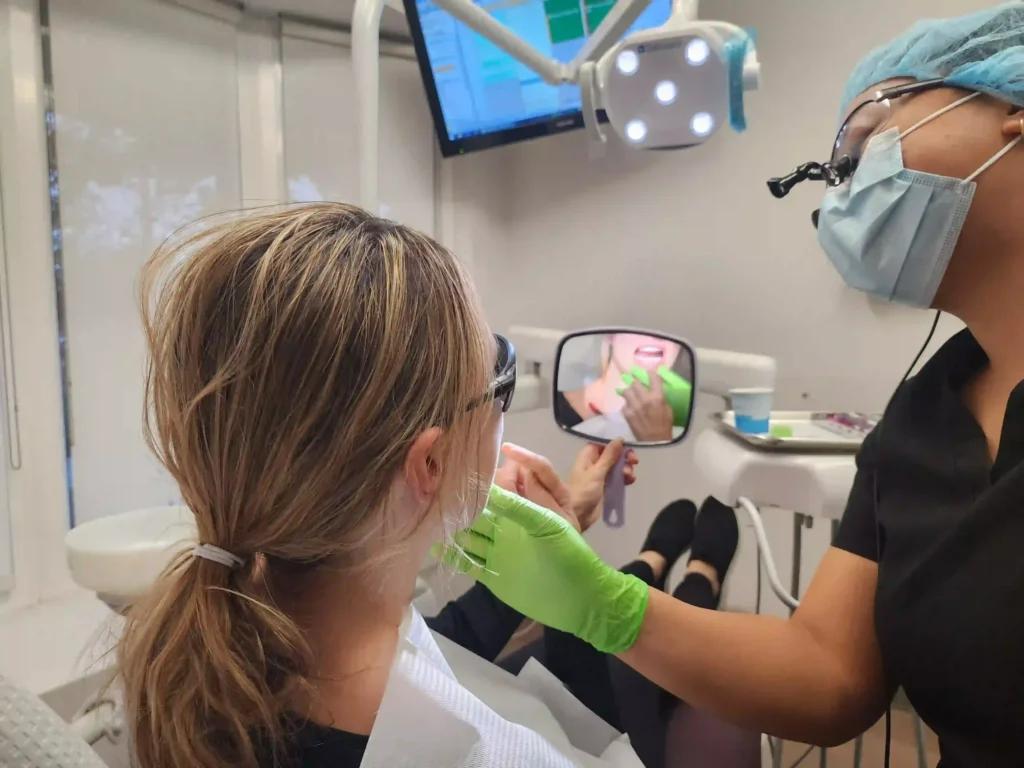
Dental emergencies can occur at any time, often when you least expect them. Knowing how to recognize these situations and understanding the necessary steps to take can make a significant difference in your oral health. Here are six dental emergencies that require immediate attention. 1. Knocked-Out Tooth A knocked-out tooth is one of the most alarming dental emergencies. It can happen due to sports injuries, falls, or accidents. If you find yourself in this situation: Act Quickly: Time is crucial. Try to see a dentist within 30 minutes.Handle the Tooth Carefully: Pick the tooth up by the crown (the top part), avoiding the root.Rinse and Store: Rinse it gently in water, but do not scrub. Place it back into the socket if possible or store it in a glass of milk or saline solution. 2. Severe Toothache A sudden, intense toothache can indicate an underlying issue such as an infection or decay. Here’s what to do: Rinse Your Mouth: Use warm water to clean your mouth. Use Pain Relief: Over-the-counter pain relievers can help until you reach the dentist. Seek Professional Help: This type of pain signals that you need to see a dentist as soon as possible to determine the cause. 3. Cracked or Fractured Tooth A cracked tooth can result from biting down on something hard or an injury. Symptoms may include pain and sensitivity. Here’s how to handle it: Avoid Chewing: Stop using the affected side of your mouth to prevent further damage. Rinse and Protect: Rinse your mouth with warm salt water and consider using dental wax to cover sharp edges. Visit Your Dentist: Contact your dentist immediately for an evaluation and treatment options. 4. Lost Filling or Crown If you lose a filling or crown, it can lead to pain and increased risk of infection. Here are steps to take: Keep the Area Clean: Rinse your mouth gently with warm salt water. Temporary Solutions: You can use dental cement (available at pharmacies) to cover the area temporarily. Schedule a Dental Appointment: Reach out to your dentist as soon as possible to avoid complications. 5. Abscessed Tooth An abscess is a painful infection at the root of a tooth or between the gum and a tooth. It can lead to serious health issues if untreated. Here’s how to recognize and respond: Identify Symptoms: Look for swelling, severe pain, fever, or a bad taste in your mouth. Do Not Squeeze: Avoid trying to pop the abscess yourself, as this can spread the infection. Seek Urgent Care: Contact your dentist right away; they may prescribe antibiotics and drainage if necessary. 6. Gum Injury or Bleeding Injuries to the gums can occur from various sources, including trauma or certain dental procedures. Here’s what to do: Rinse Your Mouth: Use warm salt water to clean the area gently. Apply Pressure: If there’s bleeding, apply gentle pressure with a clean cloth or gauze. Consult Your Dentist: If bleeding continues for more than 10 minutes or if there is severe pain, get professional help immediately. Conclusion Recognizing dental emergencies and knowing how to respond can save your teeth and protect your overall health. Always prioritize immediate communication with your dentist for any urgent issues. Regular dental check-ups can also help prevent many of these emergencies from occurring in the first place. By staying informed and prepared, you can ensure that you handle these situations effectively and maintain a healthy smile for years to come. FAQs About Dental Emergencies 1. What constitutes a dental emergency? A dental emergency includes situations like a knocked-out tooth, severe toothache, cracked or fractured tooth, lost filling or crown, abscessed tooth, and gum injuries or bleeding. Any situation that causes significant pain, injury, or risk of infection is considered an emergency. 2. How quickly should I see a dentist after a dental emergency? It’s best to see a dentist as soon as possible, ideally within 30 minutes for a knocked-out tooth or within a few hours for other emergencies. Prompt treatment can often save the tooth or prevent further complications. 3. Can I treat dental emergencies at home? While some initial care can be performed at home (like rinsing with salt water or using over-the-counter pain relievers), it’s crucial to consult a dentist for proper diagnosis and treatment. Home remedies should not replace professional care. 4. What should I do if my tooth is knocked out? If your tooth is knocked out, handle it carefully by the crown, rinse it gently, and try to place it back into the socket. If that’s not possible, store it in milk or saline, and see a dentist immediately. 5. How can I prevent dental emergencies? Regular dental check-ups, maintaining good oral hygiene, being cautious with hard foods, and wearing protective gear during sports can help prevent many dental emergencies. 6. What are the signs of an abscessed tooth? Signs of an abscessed tooth include severe tooth pain, swelling in the gums, a bad taste in the mouth, fever, and sensitivity to hot or cold temperatures. If you experience these symptoms, seek dental care promptly. 7. Is it normal to experience bleeding gums? While occasional gum bleeding can result from brushing too hard or flossing improperly, consistent bleeding may indicate gum disease or injury. If bleeding persists, consult your dentist. 8. What should I do if I lose a filling or crown? If you lose a filling or crown, rinse your mouth with warm salt water and avoid chewing on that side. You can use temporary dental cement if available and schedule an appointment with your dentist as soon as possible.
How To Handle Common Dental Emergencies At Home
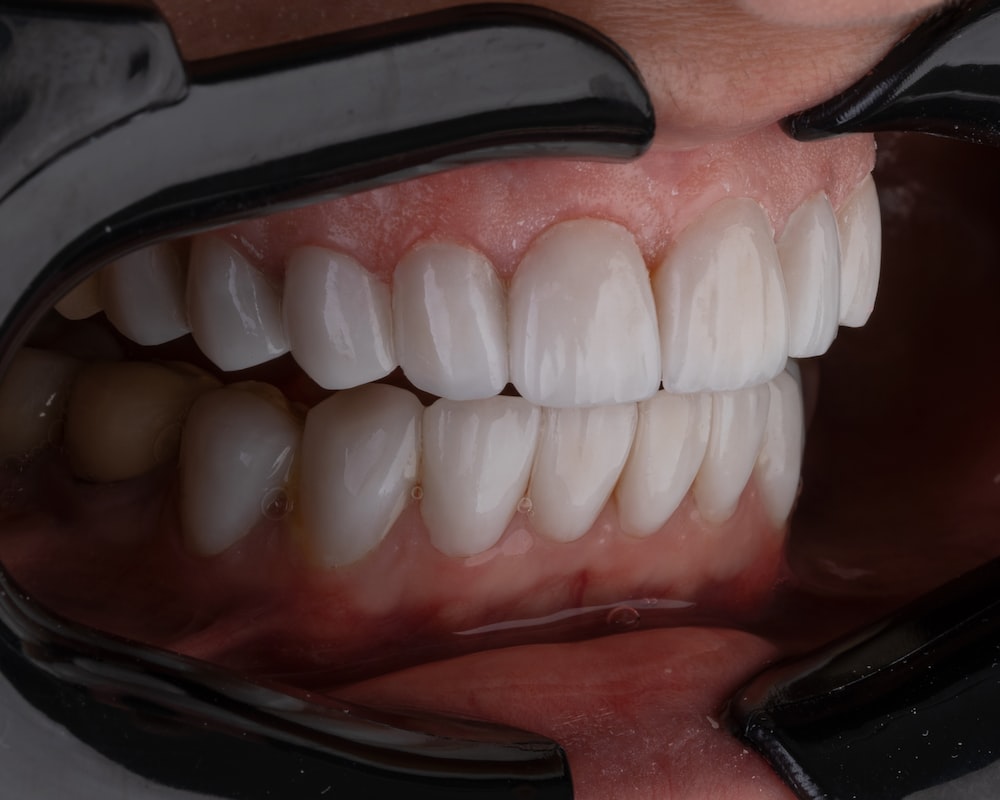
Common dental emergencies include toothaches, broken teeth, and knocked-out teeth. Prompt treatment is essential to prevent further complications. Dental emergencies often occur unexpectedly and can cause significant discomfort and distress. These situations require immediate attention to alleviate pain and prevent further damage. Common dental emergencies include severe toothaches, chipped or broken teeth, knocked-out teeth, and lost fillings or crowns. Ignoring these issues can lead to more serious problems and potentially expensive treatments. It’s important to know how to handle these emergencies effectively and seek prompt professional care. Understanding what constitutes a dental emergency and having a plan in place can make a significant difference in preserving oral health. Always keep your dentist’s contact information handy for quick access during unexpected situations. Toothaches Toothaches are a common dental emergency that can strike at any moment. They can be incredibly painful and disruptive to your daily life. Understanding the causes, symptoms, and home remedies for toothaches can help you manage the pain until you can see a dentist. Let’s dive into the details. Causes Of Toothaches Toothaches can arise from various sources. Knowing the causes can help in addressing the root of the problem: Cavities: Bacteria in your mouth produce acids that eat away at your tooth enamel, leading to cavities. Gum Disease: Inflammation and infection of the gums can cause significant pain. Tooth Abscess: A pocket of pus caused by a bacterial infection can lead to severe pain and swelling. Tooth Fracture: Cracks or breaks in the tooth can expose nerves, causing intense pain. Tooth Eruption: In children, the growth of new teeth can cause pain and discomfort. Here’s a table summarizing the common causes of toothaches: Cause Description Cavities Bacterial acids erode tooth enamel Gum Disease Inflammation and infection of the gums Tooth Abscess Pocket of pus from bacterial infection Tooth Fracture Cracks or breaks exposing nerves Tooth Eruption New teeth growth in children Symptoms Of Toothaches Recognizing the symptoms of a toothache can help in seeking timely dental care. Common symptoms include: Sharp or Throbbing Pain: Pain that comes and goes or is constant. Swelling: Swelling around the affected tooth or jaw. Fever: A fever may indicate an infection. Bad Breath: Persistent bad breath can accompany toothaches. Sensitivity: Sensitivity to hot, cold, or sweet foods and drinks. Here is a list of symptoms to watch out for: Sharp or throbbing pain Swelling around the tooth or jaw Fever Bad breath Sensitivity to temperature or sweets Home Remedies For Toothaches While waiting to see a dentist, these home remedies can help alleviate the pain: Saltwater Rinse: Mix a teaspoon of salt in a glass of warm water. Rinse your mouth with the solution to reduce inflammation and kill bacteria. Cold Compress: Apply a cold pack to the outside of your cheek for 15 minutes. This can reduce swelling and numb the pain. Over-the-Counter Pain Relievers: Medications like ibuprofen or acetaminophen can help manage the pain. Garlic Paste: Crush a garlic clove and apply the paste to the affected area. Garlic has natural antibacterial properties. Clove Oil: Apply a small amount of clove oil to a cotton ball and place it on the tooth. Clove oil has numbing and antibacterial properties. A table outlining these remedies: Remedy Description Saltwater Rinse Reduces inflammation and kills bacteria Cold Compress Reduces swelling and numbs pain Over-the-Counter Pain Relievers Manages pain Garlic Paste Natural antibacterial properties Clove Oil Numbing and antibacterial properties These remedies can provide temporary relief but always consult a dentist for a permanent solution. Chipped Or Broken Teeth Dental emergencies can happen at any time, causing pain and stress. One common issue is chipped or broken teeth. These accidents can affect your smile and overall oral health. Understanding the causes, symptoms, and treatment options is crucial for managing this dental problem effectively. Causes Of Chipped Or Broken Teeth Chipped or broken teeth can occur due to various reasons. Knowing these causes can help in preventing such accidents. Below are some common causes: Physical trauma: Accidents or falls can cause your teeth to chip or break. Sports injuries: Playing contact sports without a mouthguard increases the risk. Chewing hard objects: Biting down on hard foods like ice, nuts, or candies can lead to fractures. Teeth grinding: Bruxism, or teeth grinding, especially at night, can wear down teeth. Weak teeth: Tooth decay or large fillings can weaken teeth, making them more prone to breaking. Here’s a table summarizing the causes: Cause Description Physical trauma Accidents or falls causing direct impact on teeth. Sports injuries Contact sports without protective gear like mouthguards. Chewing hard objects Biting down on hard foods or objects. Teeth grinding Bruxism, often occurring during sleep. Weak teeth Decay or large fillings that compromise tooth structure. Symptoms Of Chipped Or Broken Teeth Identifying symptoms early can lead to prompt treatment. Here are some signs to watch for: Visible damage: A chipped or broken tooth is often visible to the naked eye. Pain: Discomfort may occur, especially when chewing or biting. Sensitivity: Increased sensitivity to hot, cold, or sweet foods and drinks. Sharp edges: The broken tooth may have sharp edges that can cut your tongue or cheek. Swelling: Gums around the affected tooth may become swollen or tender. Here’s a detailed table of symptoms: Symptom Description Visible damage Chips or breaks that are noticeable. Pain Discomfort, especially while chewing. Sensitivity Reaction to hot, cold, or sweet foods. Sharp edges Jagged edges that can injure soft tissues. Swelling Tender or swollen gums near the affected tooth. Treatment Options For Chipped Or Broken Teeth Treating chipped or broken teeth depends on the severity of the damage. Below are some common treatment options: Dental bonding: Dentists use a tooth-colored resin to repair small chips. Veneers: Thin porcelain shells cover the front of the teeth, ideal for larger chips. Crowns: A crown or cap covers and protects a broken tooth, especially if a large portion is damaged. Root canal: If the damage affects the tooth’s pulp, a root canal may be necessary. Dental implants:
Different Types Of Cosmetic Dental Procedures
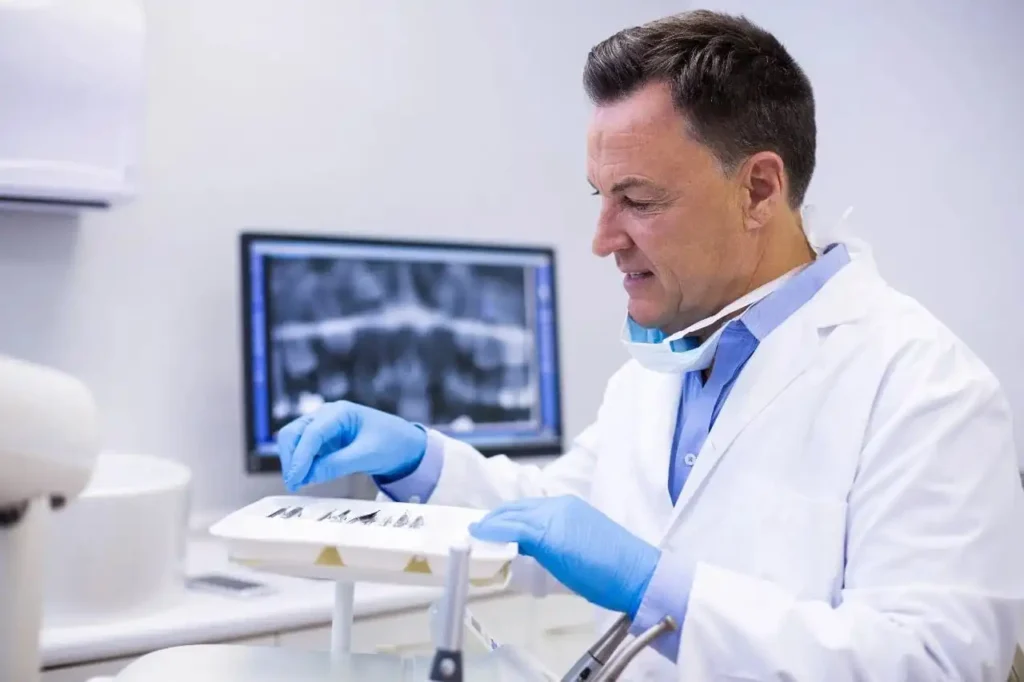
Cosmetic dentistry enhances the appearance of teeth and gums. It includes procedures like teeth whitening, veneers, and bonding. Cosmetic dentistry focuses on improving the aesthetics of your smile. It offers a range of treatments designed to enhance the look of your teeth, gums, and overall smile. Popular procedures include teeth whitening, which brightens discolored teeth, and veneers that cover imperfections. Bonding repairs chipped or cracked teeth, while orthodontic treatments straighten misaligned teeth. Cosmetic dentistry can boost confidence and improve oral health. Many seek these treatments for a more attractive smile. An experienced cosmetic dentist customizes treatments to meet individual needs, ensuring optimal results. The Evolution Of Cosmetic Dentistry Cosmetic dentistry has transformed many smiles. The journey from rudimentary procedures to advanced techniques is fascinating. The evolution of cosmetic dentistry showcases innovation and dedication to aesthetics and function. Origins Of Cosmetic Dentistry Cosmetic dentistry has ancient roots. Early civilizations valued aesthetic dental work. Egyptians used gold for dental crowns. Etruscans crafted dentures from ivory. These early practices were rudimentary but showed the importance of a beautiful smile. In the 18th century, Pierre Fauchard, the father of modern dentistry, introduced dental prosthetics. He used human teeth and metal to create dentures. This marked the beginning of more sophisticated cosmetic procedures. By the 19th century, porcelain became popular for dental work. Porcelain teeth were more natural-looking and durable. Dental practices evolved to include teeth whitening and alignment. These early advancements laid the groundwork for modern techniques. Important milestones in early cosmetic dentistry: Ancient gold and ivory dentures Pierre Fauchard’s dental prosthetics 19th-century porcelain teeth Technological Advancements In Cosmetic Dentistry Today’s cosmetic dentistry is highly advanced. Technological advancements have revolutionized procedures. Digital imaging allows precise planning. Dentists can now create 3D models of teeth. This ensures accuracy and better results. Laser technology has also made an impact. Lasers can whiten teeth, reshape gums, and remove decay. This technology is less invasive and reduces recovery time. Modern materials have also improved cosmetic dentistry. Composite resins blend seamlessly with natural teeth. Ceramic crowns are more durable and lifelike. These materials enhance both function and aesthetics. Key technological advancements include: Digital imaging and 3D modeling Laser technology for various procedures Advanced materials like composite resins and ceramics Table of technological advancements: Technology Benefits Digital Imaging Precision and accuracy Laser Technology Minimally invasive, quick recovery Advanced Materials Natural look, enhanced durability These innovations have made cosmetic dentistry more effective and accessible. Patients can now achieve their dream smiles with minimal discomfort and excellent results. Popular And Different Types Of Cosmetic Dental Procedures Cosmetic dentistry offers a variety of procedures to enhance your smile. These treatments can help you achieve the perfect teeth. Let’s explore some popular and different types of cosmetic dental procedures. Teeth Whitening Teeth whitening is one of the most popular cosmetic dental procedures. It helps to brighten your smile by removing stains and discoloration. This procedure can be done at the dentist’s office or at home with a kit. There are several benefits to teeth whitening: Improves appearance and boosts confidence Removes stubborn stains from coffee, tea, and smoking Non-invasive and quick results Two main types of teeth whitening methods include: Method Description In-Office Whitening Professional treatment done by a dentist, provides quick and dramatic results. At-Home Whitening Whitening kits are provided by the dentist for home use, offering convenience and gradual results. Dental Veneers Dental veneers are thin shells placed over the front surface of teeth. They are custom-made to fit your teeth perfectly. Veneers can change the color, shape, size, and length of your teeth. Benefits of dental veneers include: Natural tooth appearance Stain resistance Durable and long-lasting Types of dental veneers: Porcelain Veneers: Made from high-quality porcelain, these veneers look very natural and are resistant to stains. Composite Veneers: Made from resin material, these veneers are less expensive but may not last as long as porcelain veneers. Dental Implants Dental implants are a permanent solution for missing teeth. They involve placing a titanium post into the jawbone, which acts as a root for the replacement tooth. Key benefits of dental implants include: Improved appearance and speech Enhanced comfort and durability Bone preservation The process of getting dental implants involves: Consultation: The dentist evaluates your dental health and discusses the best treatment plan. Surgery: The titanium post is surgically placed into the jawbone. Healing: The jawbone needs time to heal and integrate with the implant. Placement: The final crown is attached to the implant, completing the procedure. Orthodontic Treatments Orthodontic treatments are used to correct misaligned teeth and jaws. These treatments can improve your bite and overall dental health. Common types of orthodontic treatments include: Braces: Traditional metal braces are the most common. They use brackets and wires to gradually move teeth into place. Clear Aligners: These are a popular alternative to braces. They are clear, removable trays that move teeth over time. Retainers: These devices are used after braces to maintain the position of straightened teeth. Benefits of orthodontic treatments: Improved oral health Enhanced appearance and confidence Better bite and jaw alignment Orthodontic treatments can be suitable for both children and adults, offering a path to a healthier, more attractive smile. Benefits Of Cosmetic Dentistry Cosmetic dentistry has revolutionized the way people perceive their smiles. Beyond aesthetics, it offers numerous benefits that positively impact overall well-being. From boosting self-esteem to enhancing oral health and restoring functionality, the advantages of cosmetic dentistry are profound. Improved Confidence One of the most significant benefits of cosmetic dentistry is the boost in confidence. A bright, beautiful smile can transform your self-image. People who are unhappy with their teeth often hide their smiles, leading to a lack of confidence in social situations. Cosmetic dentistry addresses various aesthetic issues: Teeth whitening eliminates stains and discoloration. Veneers correct chipped or misshapen teeth. Orthodontics align crooked or misaligned teeth. With these treatments, individuals feel more attractive and confident. They smile more freely, leading to better social interactions and opportunities. A confident smile can also enhance professional success. Studies show
Understanding The Role of A Dentist in Scarborough
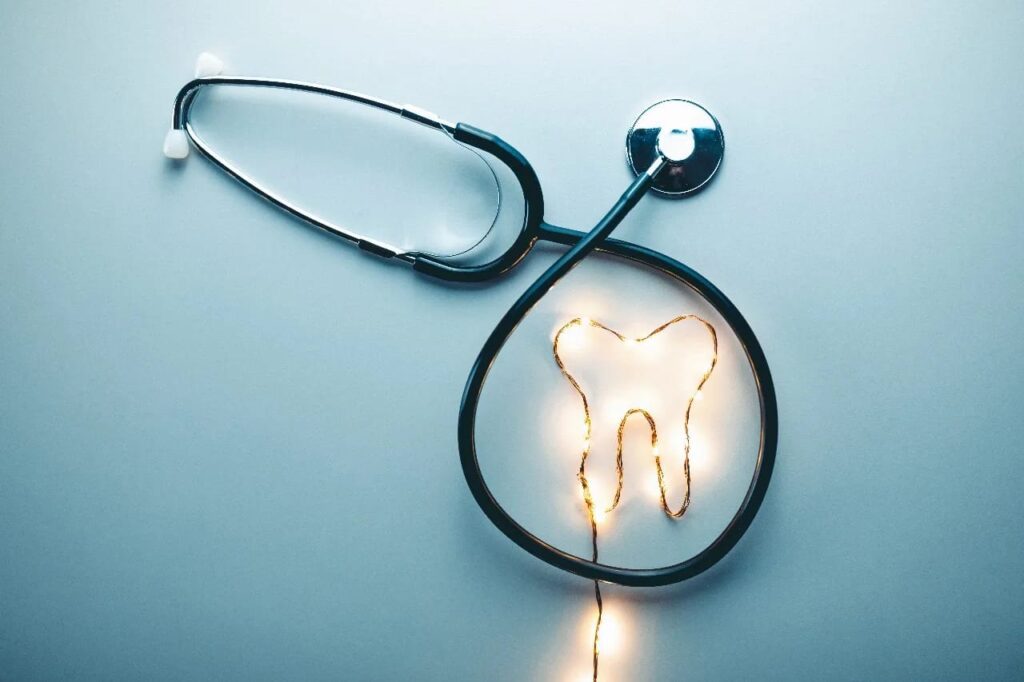
A dentist specializes in oral health, providing treatment and care for teeth and gums. These professionals perform dental procedures, offer advice, and diagnose issues. Dentists in Scarborough play a crucial role in maintaining overall health, as oral conditions often reflect the state of the body as a whole. Regular visits to a dentist can prevent dental problems before they become serious, ensuring that teeth and gums remain healthy. They are adept at addressing tooth decay, gum diseases, and misalignment, among other oral health concerns. With advancements in dental technology, dentists can offer a range of cosmetics and treatments to enhance appearance and function. Trusting your oral care to a certified dentist is essential for sustaining good dental hygiene and a confident smile. It’s also important to choose a dentist who stays updated with the latest dental practices and technologies, providing the best care possible. The Role Of A Dentist in Scarborough Ever wonder what a dentist does? Dentists are essential to our health. They keep our teeth and gums healthy. Now, let’s explore their role, education, and what they do daily. Education And Training Becoming a dentist requires hard work. First, they complete a college degree. Next, they attend dental school. This usually takes four years. They learn about teeth, gums, and jaws. Some go further, specializing in areas like orthodontics. Undergraduate degree: A must before dental school. Dental Admission Test (DAT): They must pass this test. Dental school: Four years of intense study. Licensing: Dentists need a license to practice. Continued education: They keep learning new things. Duties And Responsibilities Dentists have many important jobs. They diagnose oral diseases. They create treatment plans. They promote oral health. They interpret X-rays and diagnostic tests. They monitor the growth and development of teeth and jaws. They perform surgical procedures on teeth, bones, and soft tissues. Area Tasks Preventive Care Cleanings, exams, sealants Restorative Care Fillings, crowns, bridges Orthodontics Braces, Invisalign Surgery Extractions, implants Pain Management Treat discomfort, infections They also advise on diet, brushing, flossing, and using fluoride. They make models and measurements for dental appliances. Dentists make sure patients feel safe and comfortable. Types Of Dentists Finding the right dentist is key to great oral health. Different types serve unique needs. Below are some specialists. General Dentist General dentists are the primary providers of dental care. They handle regular check-ups, cleanings, X-rays, and basic dental work. If you need a cavity filled or a chipped tooth fixed, a general dentist is your go-to professional. Orthodontist Orthodontists specialize in teeth alignment. They use braces, retainers, and other devices to correct misaligned teeth. If your teeth are crooked or your bite is off, an orthodontist will have the right tools and skills to help. Endodontist Endodontists have special training in treating tooth pain and diseases related to the tooth’s inner pulp. If you need a root canal, this is the specialist for you. They’re experts in saving damaged teeth. Periodontist Periodontists treat gum-related diseases. They focus on inflammatory conditions that destroy the gums and other structures that support teeth. If you have severe gum disease, a periodontist provides the advanced care you need. Oral And Maxillofacial Surgeon Oral and Maxillofacial Surgeons are the experts in face, mouth, and jaw surgery. They extract teeth, place implants, and perform advanced reconstructive surgeries. Pediatric Dentist Pediatric dentists cater to children’s dental needs. They create a friendly environment for kids. If your child needs dental care, these specialists ensure their experience is pleasant and effective. Note for developers: Ensure all the H3 tags within the content are rendered according to HTML syntax when implementing on WordPress. Common Dental Procedures Dentists help keep our teeth healthy. Many treatments fix different tooth problems. Let’s dive into some common dental procedures. Each one uniquely helps you. Keeping your smile bright is important. Teeth Cleaning And Exam Regular check-ups matter for healthy teeth. Dentists clean away plaque and tartar. They look for any tooth issues. Early problem detection saves you from discomfort. Twice a year is the standard recommendation. Removal of plaque and tartar Checking for cavities and gum disease Polishing your teeth Providing tips for at-home care Tooth Extraction Tooth removal can prevent more issues. Sometimes a tooth cannot be saved. Extraction might be the best choice. Dentists aim to make this process as painless as possible. Removing damaged or decayed teeth Extracting wisdom teeth for better alignment Fillings And Restorations Fillings fix cavities. They restore the tooth’s shape and function. Many materials can be used. Dentists remove decay first. After, they fill the tooth. Root Canal Root canals save infected teeth. They remove the damaged nerve and pulp. The area is then cleaned and sealed. This procedure relieves pain and saves the tooth. Dental Implants Dental implants replace missing teeth. They serve as tooth root substitutes. Implants provide a strong base for fixed or removable teeth. They match your natural teeth. Orthodontic Treatment Braces straighten your teeth. Orthodontic treatment improves your bite. Different types are available. Options range from traditional metal to clear aligners. Maintaining Oral Health Oral health is key to a vibrant smile and overall well-being. The mouth is the gateway to the body, making oral care essential. Maintaining oral health involves several daily practices and lifestyle choices. Follow these steps for a healthier smile. Brushing And Flossing Daily brushing and flossing ward off cavities and gum disease. Brush twice a day using a fluoride toothpaste. Spending two minutes each session ensures thorough cleaning. Floss daily to remove plaque and food between teeth. Change your toothbrush every three to four months. Regular Dental Check-ups Visiting a dentist biannually prevents severe dental issues. Regular check-ups spot problems early when they’re easier to treat. Dentists clean hard-to-reach areas. They check for tooth decay and gum disease. Professional advice on custom care keeps teeth healthy. Healthy Diet Eating nutritious foods supports strong teeth and gums. A balanced diet provides the minerals and vitamins teeth need. Food Type Benefits Fruits and vegetables Increases saliva to wash food particles away.

